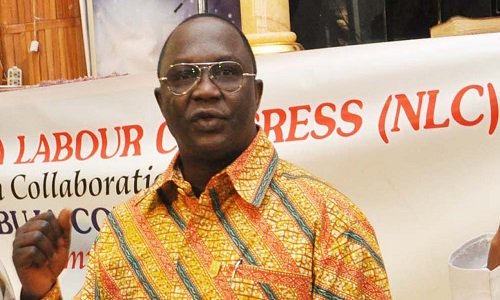
About ten states have concluded negotiations with workers on consequential adjustments and ready to implement the N30, 000 national minimum wage, the Nigeria Labour Congress(NLC) has said.
Already, workers in Lagos and Kaduna, along with those at the Federal level, have started enjoying the new minimum wage.

The states, which have concluded discussions on consequential adjustments, according to NLC are:
Adamawa,
Bauchi,
Borno,
Jigawa,
Kaduna,
Kano,
Katsina,
Kebbi,
Lagos and
Ebonyi.
NLC President, Ayuba Wabba, who appeared on Channels Television’s ‘Sunrise Daily’ programme on Monday, said the ten states met the December 31, 2019 deadline set by organised labour.
Organised labour had on December 11, 2019 at a meeting with its state chairmen in Abuja, set December 31 of the same year for all state governors to conclude negotiations with workers in their states following an agreement with the Federal Government on October 18, 2019.
President Buhari had in April 2019 signed the new wage bill aimed at boosting the morale of the Nigerian workers into law.
On October 18, 2019 after about six months of negotiations, the Federal Government reached an agreement with organised labour on the consequential adjustments after a lengthy negotiation process that dragged for months.
The federal government and organised labour agreed on per cent increase of 23.2 for workers on level seven and 20 per cent for workers on level eight, while it agreed on 19 per cent increase for workers on level nine.
Also, both the federal government and organised labour reached an agreement on 16 per cent salary increase for workers on level 10- 14 and 14 per cent increase for workers on level 15-17.
Wabba said about 23 states were still on the discussion table with labour leaders in their states on consequential adjustments.
He insisted that state governor do not have any reason not to pay the N30,000 minimum wage.
According to Wabba, the new wage is binding on all states following Buhari’s assent.
He said: “We are actually on tract. The Federal Government has set the pace. They have been able to meet up with all the obligations, including payment of arrears. Let us also not lose sight of the fact that from the day the President assented to the bill, it becomes a law. Therefore, states have no reason not to respect a law that had been enacted.
“So far so good, we have about ten states that have concluded the process of collective bargaining and some have commenced payment. They are in three categories. First are the states that have respected the deadline (December 31). They are Adamawa, Bauchi, Borno, Jigawa, Kaduna, Kano, Katsina, Kebbi, Lagos and Ebonyi.
“We have those (states) that are still on the table and they have until yesterday (January 5) to complete the process. This constitutes about 23 states that are on the discussion table and we have seen commitments.
“We insist on the process of collective bargaining because we don’t want an allocation of peanuts to workers. The principle of collective bargaining is enshrined in international law that workers should be able to know what they will be paid because the N30, 000 is already a law. What we are discussing is the consequential adjustment.
“That is why the unions are interested in looking at the details before they sign. Some (states) will want to pay peanut and that is what we are trying to avoid.”
The NLC president said that three states – Cross River, Kogi and Taraba, had yet to set up a committee to negotiate the consequential adjustments, warning that organised labour may be forced to declare a strike.
Wabba said the leadership of the NLC will meet with those of the Trade Union Congress and the Joint Public Service Negotiating Council (JPSNC) to review the situation state by state and take action.
“We have three states that are yet to commence anything. We have Cross River, Kogi and Taraba state. These states are yet to even constitute the negotiating committee and these three states have not shown enough commitment to actually start the process of negotiating and implementing the minimum wage.
“We will engage them but certainly there must be a time to conclude all those processes. Because when we allow the arrears to accumulate then it becomes compounded.
“Certainly, we are not going to set another deadline. That will be on the basic of specific request from states but the deadline we have set for December 31 2019 certainly stands.
“We are going to engage all those states (still on the negotiating table) in the weeks to come in the normal way of labour. We are not fully satisfied but we need to commend those states, particularly the ten that I have mentioned that have actually complied. If the ten that I have mentioned have complied then other states have no reason (not to comply).
“If need be in a particular state where government remains adamant workers will have no option than to go on strike because workers are not slaves. That is the only instrument that we have which is recognised by law.
“Our structures will have meet within the week. The NLC leadership, TUC and JPSNC. We will review the situation state by state and where we need to send in intervention we will send intervention from the leadership and where we need to take some action we will also make sure that workers’ interest are not undermined,” he added.
